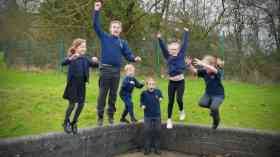In November 2020 I was told I had 6 months left to live and was at risk of sudden death, due to a colloid cyst in my brain.
Supplier Focus
Latest Supplier News
Borg & Overström is a UK manufacturer of premium drinking water solutions. For over 20 years Borg & Overström has developed sustainable, bottle-less, hygienic, drinking water dispensers with the aim to provide exceptional, safe, self-service drinking water into schools, universities, workplaces and communal spaces.

 Developing the Learning Outside the Classroom (LOtC) provision in your school grounds, local community or further afield can have an enormous impact on enthusing, engaging and motivating pupils to learn.
Developing the Learning Outside the Classroom (LOtC) provision in your school grounds, local community or further afield can have an enormous impact on enthusing, engaging and motivating pupils to learn. 








